Abstract
We present in this work the results obtained over six years from the beginning of the implementation of the School Support activity in the context or Service-Learning Practices. We focus on the value of this experience for undergraduate students in Teaching, on two specific aspects: increasing their training at the professional level and in personal growth. The participation of students since 2014 was very varied. This participation ranges from participation throughout the four academic training courses, participation during three courses plus one year, after the completion of their studies, in the volunteering modality to the participation of one year or several during the study period. The School Support activity, each course, from 2014 to 2019, was carried out for five months with the dedication of the student to 50 effective hours per course. Based on a qualitative methodology, using in-depth interview as a data collection tool, applied to all participants in this project over the last five courses, conclusions as interesting as positive: it allowed students of the Master's Degree to implement in a real context the academically acquired knowledge, before finishing their studies and at the same time favoured in the field of the personal, the strengthening of the social responsibility.
Keywords: Learning-servicevocational trainingpersonal growthsocial commitment
Introduction
The activity of school support outside the classroom began in the 2013/2014 academic year in the Faculty of Human Sciences and Education of Huesca and this is the sixth consecutive year of implementation. It is a project that has as a starting point the dialogue between the University and the Society. From the University of Zaragoza, this activity is coordinated by Dr. Rafael Díaz Fernández, professor of the subject Psychology of Education, the Master's Degree of the Faculty of Human Sciences and Education (Campus de Huesca) and from the Centre of Prevention and Promotion of Health of the Ibón Association of Drug Dependencies by Dr. María Sierra Berdejo.
The activity is carried out in Sabiñánigo, one of the most important nuclei of the industrial sector located in Alto Gállego, the most industrialized Pyrenean region of the province of Huesca, where a number of needs are detected, two of them constitute the object of this project based on the methodology of learning- service the need to put into practice the theoretical-practical knowledge acquired at the university by a group of students with a teaching and service vocation, and on the other hand, the need for support from primary school pupils to strengthen their knowledge and prevent school failure, adding protection factors such as personal and family satisfaction that generate good academic outcomes and thereby reducing the risk of addictions in adolescence.
These not-so-clear needs underlying this initiative are based on the scientific recognition that one of the factors of protection against drug use is academic success in primary and secondary. The Ibón Association of Drug Dependencies, with its twenty years of dedication to prevention for children and young people, also notes this fact, through its focus on addiction prevention and attention (Díaz and Sierra, 2008). The model that underserves this intervention is the risk theory and its central idea: working with risky factors and behaviours and acting on them trying to prevent the possible harmful consequences for health (Corona & Peralta, 2011) through the development and application of protective factors.
The project involves the management and teachers of the Schools of Early Childhood and Primary Education of Sabiñánigo: CEIP Monte Corona, CEIP Puente Sardas and Colegio Santa Ana. In addition, it has the support of the Council of Education of the City of Sabiñánigo, starting with its presentation to the Municipal School Council in 2014 and the granting of recognition by the Mayor for the occasion of the International Day of Volunteering in 2016.
The activity takes place on Saturdays from 10 am to 13 h, from the end of January to the end of May, and always after the academic results of the first evaluation. It is taught in spaces close to the homes of children. For this purpose, three different spaces are available: Casa de la Cultura de Puente Sardas, Centro de Educación de Adultos Alto Gállego and Formalas de formation del Centro Ibón.
The project is defined as "a teaching and learning strategy that integrates a meaningful community service, with instruction and reflection to enrich the learning experience, teach civic responsibility and strengthen communities" (National Service Learning Clearing Hause, n.d.). And as Martin, Rubio, Batlle, and Puig say (2010) "it is an educational proposal that combines learning and community service processes into a single, well-articulated project, where participants learn by working on real needs of the environment, in order to improve it" (p.20).
Through this activity, students of teaching engage in an activity that allows them to put into practice the theoretical knowledge acquired during the career and acquire professional experience while providing a service to the community.
In its sixth consecutive year of implementation, it is a fully systematized and expected activity by those involved: C.E.I.P. teachers, parents, primary school students and university students.
Benefits of learning-service in the training of students of teaching
The benefits of learning-service experiences, and more specifically the activity of School Support in the training of students are multiple, being able to classify into two groups: vocational training and personal growth and commitment Social. Next, we proceed to explain in more depth each of them.
The School Support activity
The School Support activity allows teaching students to train as professionals from the first years of the career. This experience translates them to the reality of the classrooms, providing them with more practical training than they receive theoretically in the faculty. "The participation of students in service-learning proposed experiences contributes to developing aspects of teaching professionalism that not all of the subjects that make up the curricula of these degrees can offer" (Garcia & Cotrina, 2015, p.10). This factor is due to the reason in many degrees the relationship between theory and practice is quite limited (García & Cotrina, 2015).
Through this learning-service activity students can implement all those methodologies, theories and knowledge that they study in the classroom, being able to check their effectiveness first hand. The service-learning allows to provide reality to the subjects of the degree, as well as to carry the development of professional teacher training (García & Cotrina, 2015). All the benefits that the service-learning brings in teacher training can be summarized in those defined by García and Cotrina (2015):
It allows students to rethink teaching as an activity that is also ethical, ideological and political (Donahue, 1999).
It helps them to realize that this is a profession of service to others, a profession with a vocation of "service", which commits us to needs, concerns, desires, academic circumstances, as well as personal, family, and of those we "serve."
The involvement in the design and implementation of service-learning projects and experiences necessarily forces future teachers to engage and engage, in the first person, in the analysis of the needs of a real context, in decision-making and in design action proposals to try to improve or transform it. This contributes to develop from professional autonomy and pedagogical "empowerment" a thoughtful, critical and emancipating teaching professionalism (Francisco & Moliner, 2010), while developing critical citizen competences.
It contributes to improving the image that students have of the teaching profession (Coladarci, 1992, p.10)
Personal growth and social engagement
Social commitment and personal growth are one of the most enriching benefits of this long-term activity. As future teachers we must know the context in which we live and their needs. We are training the citizens of the future and that is why we must develop a sense of commitment to society. Aramburu and García (2012) state:
In recent years the perspective of social justice has developed in the service-learning. Cochran-Smith (2004) notes that teacher training needs to be conceptualized as a learning problem and a political problem with an emphasis on issues of equal access and social justice in education. The contact offered by the service-learning and reflection encourages future teachers to critically examine issues such as racism and equal opportunities (Hess, Lanig, & Vaughan, 2007, p.5)
The majority of students participating in the activity are part of families from other countries. This implies a first contact with a classroom and intercultural context, which allows them to develop a common vision of education in which inclusion, equality and social justice are the pillars of it.
Problem Statement
The object of study of this work focused on knowing the positive effects that the participation in the support activity in a project of service-learning. had had on the students of the Magisterium Education of Huesca of the University of Zaragoza in collaboration with the Ibón Association of Drug Dependencies, an entity of the third sector, of a non-profit nature.
As Uruñuela (2011, p.2) states "Learning-Service is not a completely new methodology, a completely original proposal, but a way to combine two well-known methods in active pedagogies: learning through experience and action at the service of the community. The integration of service tasks and learning efforts transforms both components, adds value to each of them and creates new educational qualities, typical of the "service + learning" set. For this reason, our study focuses on both aspects the professional and personal learning that this activity provides to students and the social commitment to develop through the service they provide.
Research Questions
Throughout the six years of implementation of this project we asked ourselves a question: How does the involvement in the School Support activity benefit with a methodology of Learning Service to students that decide to participate in this University Supplemental Activity?
Purpose of the Study
The objectives of this study focus on:
Know specific details of the training of students of teaching that are expanded with participation in the school support activity.
Find out some of the improvements that students see in their personal growth that prepares them as future teachers.
Analysing how activity provided them with greater awareness of the need for social commitment as citizens.
Research Methods
To carry out this study, a sample of 17 students from the Master's Degree of the Faculty of Human Sciences and the Education of Huesca of the University of Zaragoza between 18 and 24 years of age from a total of 24 students who participated in this activity.
Qualitative methodology using it as a data collection tool structured in-depth interview. An interview consisting of twenty-one items divided into four sections. The first with four items on general data relating to the profile of informants. A second section that provided us with information regarding the benefits of the activity on vocational training of students consisting of 9 items. The third section consists of five items and provided us with information on the contributions to the personal growth of the students. A fourth and final section consisting of three items to know some of the benefits provided in relation to the social commitment acquired by the participants.
It has opted for the use of scale questions to evaluate the degree of intensity of each characteristic or variable, Likert type of opinion to measure the degree of conformity of the respondent.
On the other hand, we also have the information provided after consultation with all participants over the five years of the activity.
Findings
Profile of informants
We define in this section the profile of the informants based on the age, gender, years of participation and specialty of the studies they carry out.
Age range of participants
81.3% of the study participants are in the age span between 20 and 24 years old.
Gender
Women's participation in the activity was majority over the course of five years. 70.83% of women compared to 29.16% of men.
In terms of the participation of informants, the proportion of women is increased by up to 76.47% for women compared to 23.52% of men.
Years of participation in the activity
Regarding the years of participation in the activity of service-learning. we observed that 58.8% of students continued to provide school support for at least 2 courses, throughout their undergraduate studies. 23.5% maintained their collaboration for 3 courses and 17.6% over 4 courses.
Speciality
Most students (64.7%) were attending the Degree of Primary teaching activity. Although the activity was aimed at primary school children, 35.3% of students in the Degree of Teaching in Children also participated in this School Support activity.
Professional formation
One of the objectives of the study revolves around the idea of increasing the learning of students, through practice, since it is one of the aspects that are part of the service-learning methodology. To do this we focus on the following variables:
Understanding better theoretical content
For 76.5% of the sample, school support activity has allowed it to better understand the theoretical content that they were studying in the grade.
Relate theoretical content to its practical application
70.6% of informants said that school support activity had helped them to relate the theoretical content studied in the degree to their practical application in classrooms.
Putting knowledge, skills and methodologies into practice
76.5% of the students participating in the school support activity had implemented, with primary education children, knowledge, skills and methodologies acquired in the degree.
Reality of classrooms and the needs of students
It is particularly significant that 94.2% of pupils said that school support activity had helped them to become aware of the reality of classrooms and the different needs of students.
Development of skills to help students
It is also very important that for 94.1% of informants this activity has allowed them to develop skills to help Primary Education students.
Responsibility for learning
For 82.4% of informants, school support activity helped them become aware of their own social responsibility, as they would pursue professional work in teaching.
The implementation of service-learning experiences in their university subjects
So important had this activity been for their training that 88.3% of students felt that service-learning experiences should be implemented in the subjects of the degree.
In this same line Uruñuela (2011) points to the importance of the union of the provision of a service to the community with the learning of students as inseparable elements to talk about a quality education.
For teacher training
For 88.3% of informants, school support activity had provided extra experience in their teacher training.
Regarding the importance of teacher role in classrooms
Awareness of the importance of teacher role in classrooms had been significantly strengthened for 90% of informants, following their participation in school support activity and their interaction with Primary Education children.
Personal growth
Another aspect that we were considering with our study was to find out the improvements perceived by students in their personal growth, after participating in the activity, providing them with an added preparation as future teachers.
Discover your vocation for teaching
As we can see in Figure
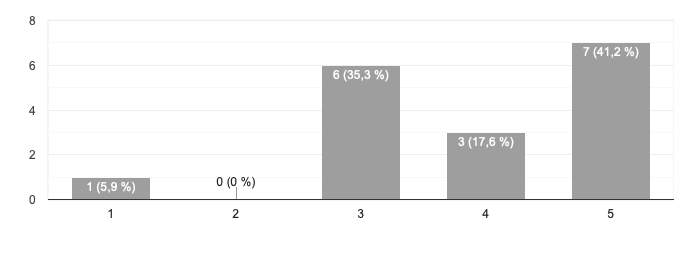
We must take into account that on more than one occasion students enrol in studies that in principle are not their first choice. They should be discovering throughout the courses whether these studies are really going to give them enough motivation to dedicate themselves professionally to what they are being trained for.
Increase personal maturity as a teacher
Particularly significant is that 88.3% of informants recognize that school support activity has helped them increase their personal maturity as teachers (see Figure
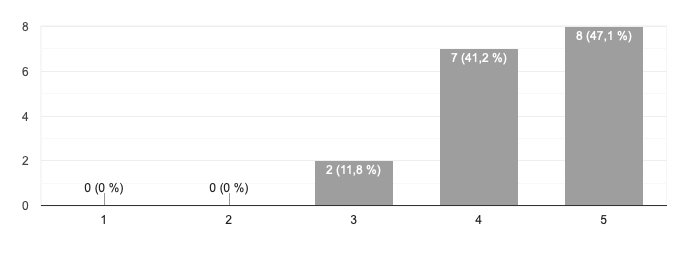
Define personal weaknesses and strengths in teaching
In addition, 76.5% of school support activity had helped them define their personal weaknesses and strengths in the field of teaching (see Figure
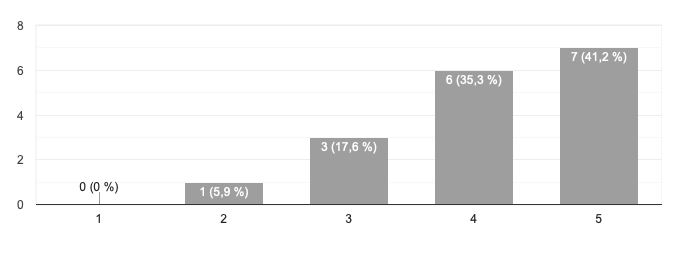
Gaining confidence and safety in teaching practice
And a percentage similar to the previous 76.4% had also helped them gain confidence and confidence in teaching practice (see Figure
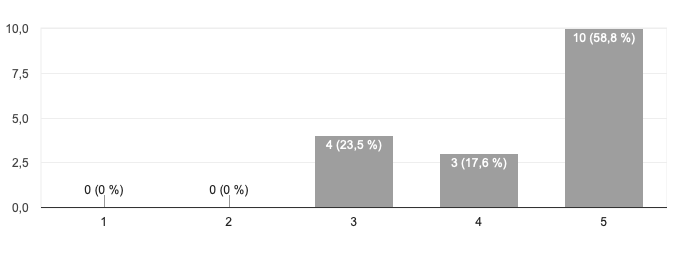
Increased self-esteem
At the same time, it is interesting to note that 70.6% of the participants, the activity, had helped them to increase their self-esteem and therefore increase the value of themselves and their own dignity (see Figure
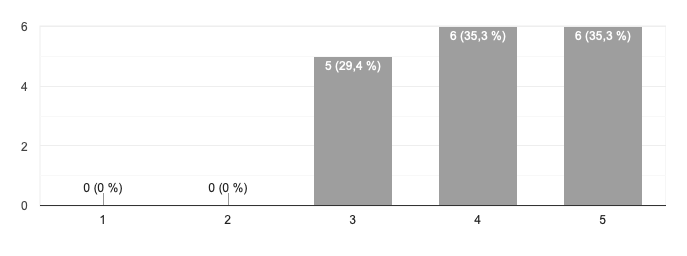
Social commitment
In addition to setting a priority objective for learning teachings for the students who participate in it, the service-learning also considers serving the community. That is why the last section of the study is devoted to the reflection of the participants on the impact of dedication to this activity in the development of their commitment to people and to social problems.
Developing awareness of the needs of the community
88.2% of the sample has allowed them to be more aware of the needs of the community (see Figure
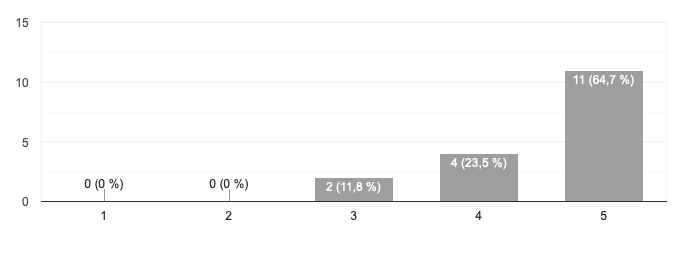
The benefit to the community
Meanwhile, as we can see in Figure
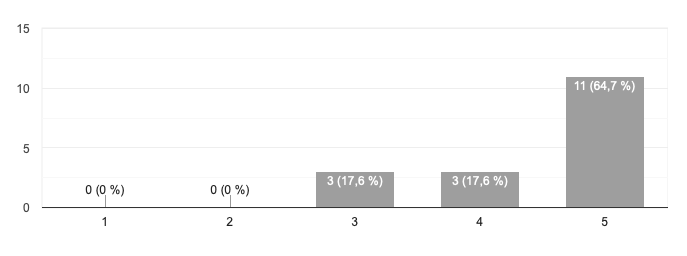
Commitment to social problems
One thing that 94.1% has coincided with, almost all of the respondents, is the recognition that the involvement in the school support activity has given them greater awareness of the positive impact of the personal commitment of citizens, when they have the possibility to help others, in solving social problems (see Figure
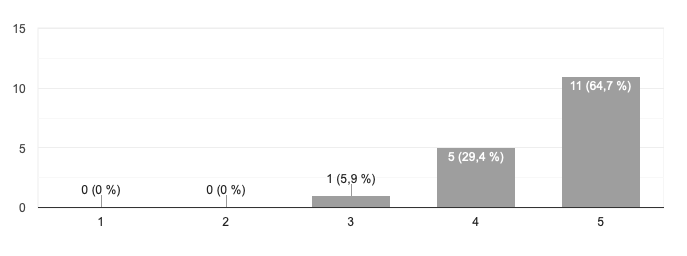
Conclusion
The profile of the students involved in the school support activity is characterized by being young people aged 18 to 24, of the female sex, participate in the activity mostly for 3 and 4 courses and especially the primary specialty.
This activity framed in the methodology of service-learning helped them to better understand the theoretical content studied in the degree, to relate them to their practical application in the classroom, putting into practice knowledge, skills and methodologies acquired in the degree.
In particular, the help that this activity has given students to become aware of the reality of the classrooms regarding the different needs of the students and to become aware of the responsibility of their own learning, making it easier for them to acquire skills to help primary school students with different typology.
The extra experience in their training as a teacher and the awareness of the importance of the teacher’s role in the classroom are highlights leading them to conclude that learning-service experiences should be implemented in the subjects of the teaching Degree.
In the field of personal growth, the contributions of this experience have been key to increase self-esteem, maturity as teachers, clarification of one's weaknesses and strengths in the practice of teaching. All this as a whole has allowed them to gain confidence and safety in the teaching practice.
In the field of social engagement, young people agreed to affirm, with an important degree of unanimity, that participation in this practice had brought them closer to greater awareness of the needs of the community, the benefits that the contribution of such activities have in the direct recipients of the service provided, in this case the children of primary education, their families and in the help to solve social problems.
References
- Aramburu, P., & García, R. (2012). El aprendizaje-servicio en la formación de maestros [Service-learning in teaching training]. Revista del Congrés Internacional de Docència Universitària i Innovació (CIDUI), 1, 3-5.
- Cochran-Smith, M. (2004). Walking the road: Race, diversity, and social justice in teacher education. Nueva York: Teachers College Press.
- Coladarci, T. (1992). Teachers' Sense of Efficacy and Commitment to Teaching. Journal of Experimental Education, 60, 323-337.
- Corona, F., & Peralta, E. (2011). Prevención de conductas de riesgo [Prevention of risky behaviours]. Revista Med. Clin. Condes, 22(1), 68-75.
- Díaz, R., & Sierra, M. (2008). Análisis teórico sobre prevención de drogodependencias en el marco de la educación para la salud: factores de riesgo y de protección [Theoretical analysis on drug addiction prevention in the framework of health education: risk and protective factors]. Zaragoza: Acciones e Investigaciones Sociales.
- Donahue, D. M. (1999). Service learning for preservice teachers: Ethical dilemmas for practice. Teaching and Teacher Education, 15, 685-695.
- Francisco, A., & Moliner, L. (2010). El Aprendizaje Servicio en la Universidad: una estrategia en la formación de ciudadanía crítica [Service Learning at the University: a strategy in the critical citizenship formation]. Revista Electrónica Interuniversitaria de Formación del Profesorado, 13, 69-77.
- García, M., & Cotrina, M. (2015). El Aprendizaje Servicio en la formación inicial del profesorado: de las prácticas educativas críticas a la institucionalización curricular [Service learning in initial teacher training: from critical educational practices to curricular institutionalization] Revista de Currículum y Formación de Profesorado, 19(1), 8-25.
- Hess, D. J., Lanig, H., & Vaughan, W. (2007). Educating for equity and social justice: A conceptual model for cultural engagement. Journal Multicultural Perspectives, 9(1), 32-39.
- Martin, X., Rubio, L., Batlle, C., & Puig, J. M. (2010). ¿Qué es aprendizaje servicio? [What is service learning?] In X. Martín, & L. Rubio (Eds.) Prácticas de ciudadanía. Diez experiencias de aprendizaje servicio. Barcelona: Octaedro.
- Naranjo, M. L. (2007). Autoestima: un factor relevante en la vida de la persona y tema esencial del proceso educativo [Self-esteem: a relevant factor in the individual life and essential theme of the educational process]. Revista Electrónica Actualidades Investigativas en Educación, 7(3), 1-27.
- Uruñuela, P. M. (2011). Aprendizaje-Servicio, una metodología para el desarrollo de la convivencia [Service-Learning, a methodology for the development of coexistence]. Revista AMazônica, 6(1), 35-61.
Copyright information

This work is licensed under a Creative Commons Attribution-NonCommercial-NoDerivatives 4.0 International License.
About this article
Publication Date
27 May 2020
Article Doi
eBook ISBN
978-1-80296-083-9
Publisher
European Publisher
Volume
84
Print ISBN (optional)
-
Edition Number
1st Edition
Pages
1-330
Subjects
Teacher training, bullying, child abuse, abusive relationship, neglected child, neglected teenager, cognitive psychology
Cite this article as:
Berdejo, M. S., & Orós, A. S. (2020). The Results In Vocational Training And The Personal Growth Of Teaching Students. In C. Salavera, P. Teruel, & J. L. Antoñanzas (Eds.), Observatory for Research and Innovation in Social Sciences, vol 84. European Proceedings of Social and Behavioural Sciences (pp. 200-210). European Publisher. https://doi.org/10.15405/epsbs.2020.05.22
